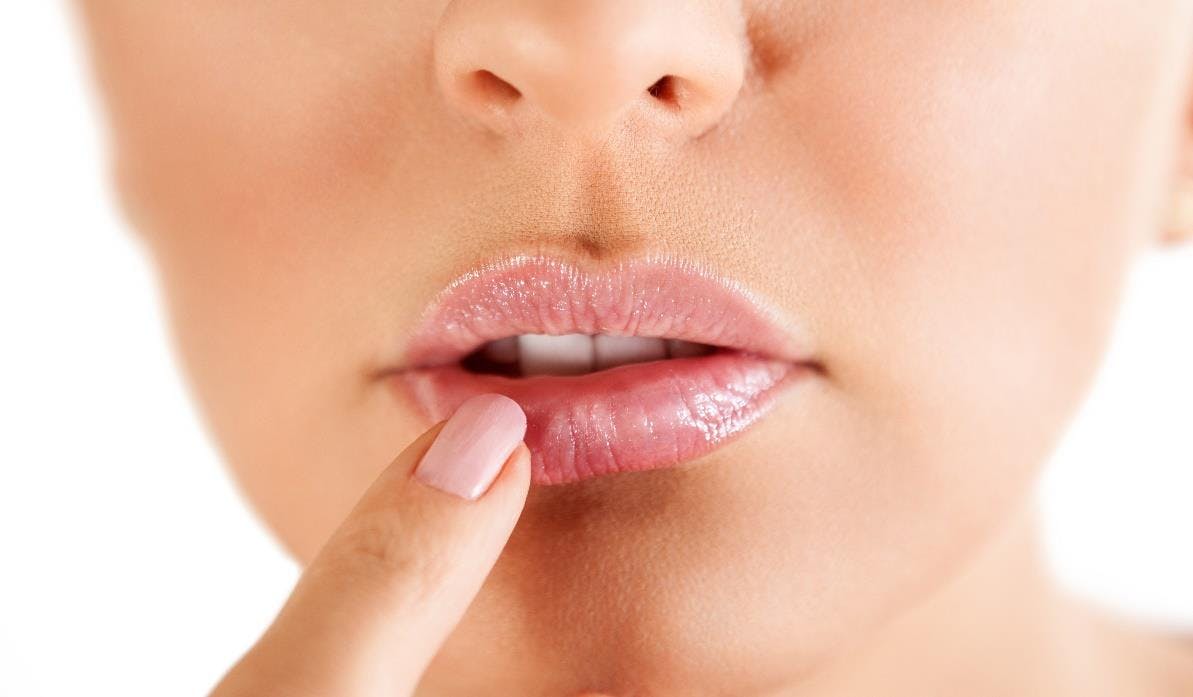Back to Dealing with Cold Sores articles
Are Cold Sores Contagious?
The question 'how are cold sores spread?' is one of the most frequently asked questions about these painful, fluid-filled blisters that appear around the mouth and lips. Knowing how cold sores are spread, why cold sores are so contagious and when they are serious can help reduce your risk of a cold sore outbreak and prevent spreading cold sores to others.
Is a Cold Sore Contagious?
Cold sores are caused by the herpes simplex virus (HSV-1), which is easily passed to other parts of your body as well as from person to person. It’s extremely common, with 3.7 billion people under the age of 50 infected by HSV-1 globally, the type that causes most cold sore cases.i However, cold sores can also be caused by HSV-2, which is mainly responsible for genital herpes, a sexually transmitted infection.
When Are Cold Sores Contagious?
If you’re wondering how long are cold sores contagious for, they are contagious from the moment you feel that first warning tingle until they have completely healed. However, they are at their most infectious when the blister bursts.ii
When Is a Cold Sore No Longer Contagious?
Cold sores are typically contagious for up to 15 days. You need to wait until all your cold sore symptoms have cleared – including the blister and any scabbing – to reach the point when cold sores are not contagious anymore.iii
How Are Cold Sores Spread?
Skin-to-skin contact is how cold sores are spread in most cases. While normal skin is resistant to the virus, it can get into your body through broken skin and mucous membranes such as the moist inner skin that lines your mouth, eyes or your genitals.iv
Most people catch the herpes simplex virus in childhood but often don’t get a cold sore for several years. After infection, the virus remains dormant inside a nerve sheath, causing no symptoms until it’s triggered. Once this happens, the virus multiplies and travels down the nerve sheath, causing a cold sore.v
The virus is spread by:vi
- Kissing someone who has a cold sore or is about to get one.
- Sharing lip balms, lipsticks or other items that have come into contact with the saliva of someone who has a cold sore.
- Oral sex with someone who has an outbreak of genital herpes.
- Touching your cold sore and then touching broken skin, eyes or genitals.
Can Cold Sores Be Serious?
In most cases, cold sores are just unsightly and painful but clear up within 15 days. However, cold sores can be serious when they affect:vii
- Your eyes – If the infection reaches the inner layers of your cornea – the transparent layer at the front of your eye – and remains untreated, it can be sight-threatening.
- Babies – Because their immune systems haven’t yet developed properly, babies can’t fight the virus easily and if the infection spreads to their vital organs, it can be fatal.
- People with weakened immunity – As with babies, the infection may spread to vital organs. People at risk include those undergoing chemotherapy for cancer or anyone with a condition affecting their immunity such as diabetes or HIV.
How Can You Stop Cold Sores From Spreading?
Follow a few simple steps to help stop cold sores from spreading.
1. Don’t Touch
Touching is how cold sores are spread. The only time you should touch a cold sore is when you’re applying cream. The less you touch it, the less likely it is that you’ll spread it elsewhere around your body or to someone else. This applies from the first tingle to when it’s totally disappeared. If you’re applying make-up around the area, use a disposable applicator such as a cotton swab rather than your fingers.

2. Wash Your Hands
You should do this after touching your cold sore and before touching your eyes, contact lenses, genitals or any area of broken skin.
3. Don’t Kiss
This means any sort of kiss, even on the cheek. It’s important to be extra careful around babies, children, pregnant women or people with lowered immunity. Most people get HSV-1 as a child through an affectionate kiss from an infected adult.
4. Avoid Oral Sex
Abstain from engaging in oral sex when you have symptoms of a cold sore, as you can pass on the HSV-1 virus, giving your partner an infection in their genital area.
5. Don’t Share Personal Items
This covers food, eating utensils, straws, cups, glasses, lipsticks, lip balm, cold sore cream and anything else that has come into contact with your saliva or cold sore.
6. Change Your Toothbrush
The virus can lurk in the bristles of your toothbrush so treat yourself to a new one after the blister has formed and again after the attack has cleared up.
7. Avoid Your Triggers
Fewer outbreaks mean a lower risk of spreading the infection. The virus tends to stay inactive until something triggers it. Everyone’s cold sore triggers are different, but you can try to limit your flare-ups by knowing – and avoiding – yours. Common triggers include:viii
- UV light from the sun or sunbeds
- Emotional stress
- Fever and common colds
- An injury to the affected area
- Hormonal changes such as during your period
8. Act Fast
If untreated, most cold sores will clear up within 15 days, but you can get rid of them quicker by applying Abreva® Cream when used at the first sign.
Abreva® works by creating a barrier to protect healthy skin cells, blocking the spread of the virus. When applied at the first sign, Abreva® is clinically proven to heal a cold sore in as little as 2½ days*. It also contains the only non-prescription cold sore ingredient the FDA has approved to shorten healing time. Apply your cold sore cream five times a day, first removing any cosmetics. You can use clean fingers or a cotton swab, gently dabbing it in, then wash your hands thoroughly.
Find out how Abreva® Cream works, and keep cold sores at bay and your lips in great condition with our top lip care tips.
FALSE. HSV-1 is a form of the herpes simplex virus that usually affects the lips or mouth, but can spread to the eyes or genitals. This does not mean you have genital herpes as this is caused by the other form of the virus, HSV-2.
FALSE. HSV-1 is a form of the herpes simplex virus that usually affects the lips or mouth, but can spread to the eyes or genitals. This does not mean you have genital herpes as this is caused by the other form of the virus, HSV-2.
FALSE. Cold sores are contagious from the first tingle until completely healed.
FALSE. Cold sores are contagious from the first tingle until completely healed.
SOURCES
i. Herpes Simplex Virus. World Health Organization. https://www.who.int/en/news-room/fact-sheets/detail/herpes-simplex-virus. Accessed 06/25/19.
ii. How long are cold sores contagious for? Medical News Today. https://www.medicalnewstoday.com/articles/326350.php. Accessed 11/12/2019.
iii. How Long are Cold Sores Contagious for?. Medical News Today. https://www.medicalnewstoday.com/articles/326350.php. Accessed 11/08/19.
iv. Can It Spread to Your Body?: Treating & Preventing Cold Sores. WebMD. https://www.webmd.com/skin-problems-and-treatments/ss/slideshow-cold-sores. Accessed 11/08/19.
v. Recurrent Herpes Simplex Labialis. Healthline. https://www.healthline.com/health/fever-blister-causes. Accessed 11/08/19.
vi. How Contagious Are Cold Sores?. Everyday Health. https://www.everydayhealth.com/skin-and-beauty/how-contagious-are-cold-sores.aspx. Accessed 11/08/19.
vii. Cold Sore. Mayo Clinic. https://www.mayoclinic.org/diseases-conditions/cold-sore/symptoms-causes/syc-20371017. Accessed 11/08/19.
viii. Can Cold Sores Be Prevented?. National Center for Biotechnology Information. https://www.ncbi.nlm.nih.gov/books/NBK525765/. Accessed 11/08/19.
*Median healing time 4.1 days. 25% of users healed in 2½ days.
By clicking the link(s) above, you will be taken to an external website that is independently operated and not managed by GSK. GSK assumes no responsibility for the content on the website. If you do not wish to leave this website, do not click on the links above.







